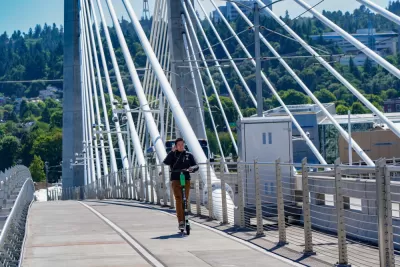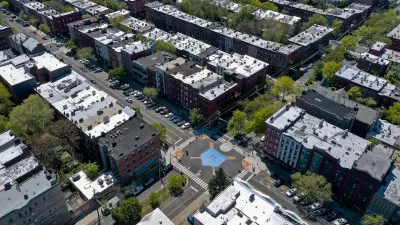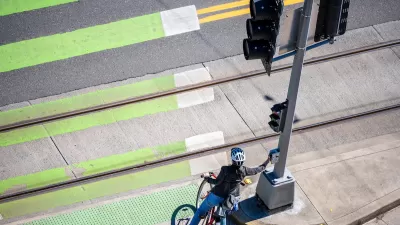E-scooters are governed by hundreds of regulations aimed at improving the safety of riders and pedestrians. Is it time to apply them to cars, too?

[Updated September 2, 2021] Streetsblog's Kea Wilson questions why, while cities have scrambled to create "hundreds of policies to minimize the downside risks of the micromobility revolution, like scofflaw riders who strike pedestrians at intersections and scooter-cluttered sidewalks rendered impassable to people who use assistive devices," no new laws have been aimed at drivers–those who cause 80 percent of fatal scooter crashes and close to 40,000 fatalities on U.S. roads every year.
Wilson outlines five scooter regulations that could be applied to cars:
- Top speed limits: with the top speed limit in the country at 85 miles per hour, Wilson asks, why should manufacturers produce cars that top out at 112 miles per hour?
- Geofencing: "Following the news that the European Union would require all new car models to come equipped with geofence-equipped speed governors that would force drivers to (mostly) obey local limits, some street safety advocates wondered whether the U.S. should do the same thing."
- Stricter height and weight limits: while weight limits for scooters are strictly regulated, American cars and trucks are growing bigger and bigger, with few legal limits on their size.
- Regular safety tests: "For years, most scooter companies have either required their riders to take a brief safety quiz before unlocking a vehicle, or at least incentivized them to learn more about safe scooting with offers of discounted rides, cheap helmets, and other perks." Why not implement a similar system for drivers, mandating the "[i]nterlock ignition devices, ambient alcohol sensors, driver monitoring systems, and a ton of other tech" that already exists?
- Helmet laws: "no U.S. community has never enforced a mandatory car-helmet law, even though car crashes are the second most common cause of traumatic brain injuries every year." The history of Streetsblog's recent editorial coverage of helmet laws should make is clear that helmet laws are included on this list is to point out the absurdity of using helmets laws as a replacement for meaningful systemic safety reform.
FULL STORY: What If Drivers Had to Follow Scooter Laws

Planetizen Federal Action Tracker
A weekly monitor of how Trump’s orders and actions are impacting planners and planning in America.

Chicago’s Ghost Rails
Just beneath the surface of the modern city lie the remnants of its expansive early 20th-century streetcar system.

San Antonio and Austin are Fusing Into one Massive Megaregion
The region spanning the two central Texas cities is growing fast, posing challenges for local infrastructure and water supplies.

Since Zion's Shuttles Went Electric “The Smog is Gone”
Visitors to Zion National Park can enjoy the canyon via the nation’s first fully electric park shuttle system.

Trump Distributing DOT Safety Funds at 1/10 Rate of Biden
Funds for Safe Streets and other transportation safety and equity programs are being held up by administrative reviews and conflicts with the Trump administration’s priorities.

German Cities Subsidize Taxis for Women Amid Wave of Violence
Free or low-cost taxi rides can help women navigate cities more safely, but critics say the programs don't address the root causes of violence against women.
Urban Design for Planners 1: Software Tools
This six-course series explores essential urban design concepts using open source software and equips planners with the tools they need to participate fully in the urban design process.
Planning for Universal Design
Learn the tools for implementing Universal Design in planning regulations.
planning NEXT
Appalachian Highlands Housing Partners
Mpact (founded as Rail~Volution)
City of Camden Redevelopment Agency
City of Astoria
City of Portland
City of Laramie





























